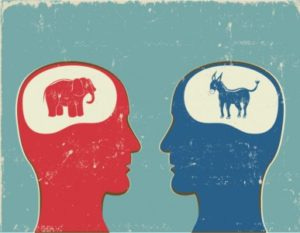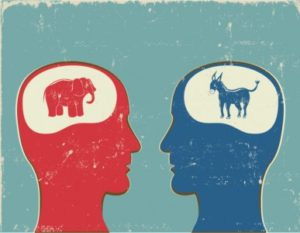
Ever since I made it clear back in February that I will not be voting for Republican presidential candidate Donald Trump in November, I've heard from a number of people who have told me that they're shocked — shocked I tell you — that I would contribute to an effort that would help Hillary Clinton win the White House.
Sure, I've also made it clear that I won't be voting for Clinton, but that's a distinction without a difference, apparently. These people's line of thinking is that withholding a vote from Trump is the same thing as casting a vote for Clinton. And of course that would be the most terrible outcome possible in November: President Elect, Hillary Clinton.
I do understand their reasoning, and in past election years I would have been much more sympathetic to that point of view. As conservative thinkers, our conventional wisdom has long been that any Republican is going to be better than any Democrat. I certainly don't begrudge those of my fellow righties who still believe that this year, but I do disagree with them.
Political parties aren't sports teams for which we should reflexively throw our support behind whoever dawns our colors and plays under our banner. That's not their intended purpose. Politically parties are vehicles by which citizens freely come together to define their societal ambitions, and advance their beliefs and interests. If the drivers of both available vehicles are going to take you in the opposite direction of your destination, why get into either of their cars?
I have serious concerns about the future of this country, but supporting either Trump or Clinton would require me to relinquish them, or at bare minimum accept that they really aren't all that important.
For years I've been railing against the inherent dishonesty of the Obama administration, whether it be the lies about Obamacare, the threat of ISIS, the Iran deal, or a host of other face-saving, agenda-pushing initiatives. Unfortunately, I would have to abandon those concerns if I voted for either Clinton or Trump. Clinton, of course, is chronically dishonest. She lies about trivial things (like the origins of her first name). She lies about hugely important things (like what prompted the Benghazi attack, and the type of data that was on her private email server). She'll say whatever it takes to advance her profile and protect herself from scrutiny.
Unfortunately, Donald Trump is every bit as deceitful — perhaps even more so. The man can't seem to make it through a single interview or speech without telling multiple lies. He fabricates "facts" on the fly, and either clings to them when challenged, or denies that he ever spoke them in the first place (despite video footage proving otherwise). Whether its Mexican rapists, thousands of New Jersey Muslims celebrating 9/11, Iraq conspiracy theories, or how much money he's raised for U.S. veterans, this man's reflexive assaults on the truth are well documented.
Of course, a point that a number of people have tried to make to me is that Clinton's lies are more dangerous and repugnant than Trump's. That's probably true considering the high-level positions she's held in public office, and the abuses of power that fueled those lies. What those same people fail to consider, however, is the near certainty that Trump would do exactly the same things, in the same situations, if given that same power.
We're talking about a guy, after all, who linked the father of a political opponent (from the same party, and whom he had essentially already defeated) to the assassination of John F. Kennedy, just for the fun of it. Does anyone honestly think he'd have moral qualms with lying to the families of four patriots who were murdered by terrorists — especially if it meant protecting himself politically?
I suppose that's unfair speculation on my part, but based on the severity of Trump's lies for even the most trivial of motivations, I don't think it's all that far of a leap. I really don't.
Beyond the honesty factor, there's the question of character as a whole. Are either guided by anything other than self-interest? Are either truly sympathetic to the challenges of others? In my view, this is an area where Republican candidates used to hold an edge, even if they couldn't convince the electorate of it. Not this year, however. If mocking American POWs and disabled people aren't automatic disqualifiers, I don't know what is.
For years I've been complaining about the size and growth of the national debt under the Obama administration (and before), which I believe to be perhaps this nation's greatest threat. Unfortunately, I would have no recourse with either Clinton or Trump. Neither has a serious plan to deal with it, and both are dead set against reforming our entitlement programs.
For years I've been complaining about Obamacare and have been calling for its repeal. Clinton's been adamant that it won't happen under her watch. Trump claims he'll repeal it, but as a longtime fan of universal healthcare (which he advocated for as recently as September) under a single-payer system, any healthcare reforms supported by Trump would likely result in more (not less) government involvement in this area. Yet, I'm supposed to choose between these two fates.
Healthcare, of course, is just one of many examples of Trump's instinctive liberalism that has been glossed over with fresh, shallow rhetoric, and propped up by people within the conservative media. An honest, accurate picture of the Republican Party's ideological lurch to the left (and its newfound embrace of failed Obama policies under the Trump brand) was displayed in a recent piece by Charles Krauthammer.
The reality is that both party's presumptive nominees are liberal individuals. Trump's even managed to rhetorically slide to the left of Clinton on some topics, most notably in the realm of foreign policy, where some of his hyperbole mirrors that of the anti-war group, Code Pink.
Like Obama, both are firm believers in big-government solutions, less personal responsibility, and fewer individual rights. That creed will flow into every decision either of them will make while in office (including Supreme Court nominees).
So what is it, exactly, that makes Clinton measurably less acceptable of a choice than Trump? What bullet would be dodged by choosing Trump over Clinton? Is there really a singular boogeyman in this race? If people can't answer those questions, perhaps it's time to end this silly narrative about the importance of party loyalty in the year 2016.











